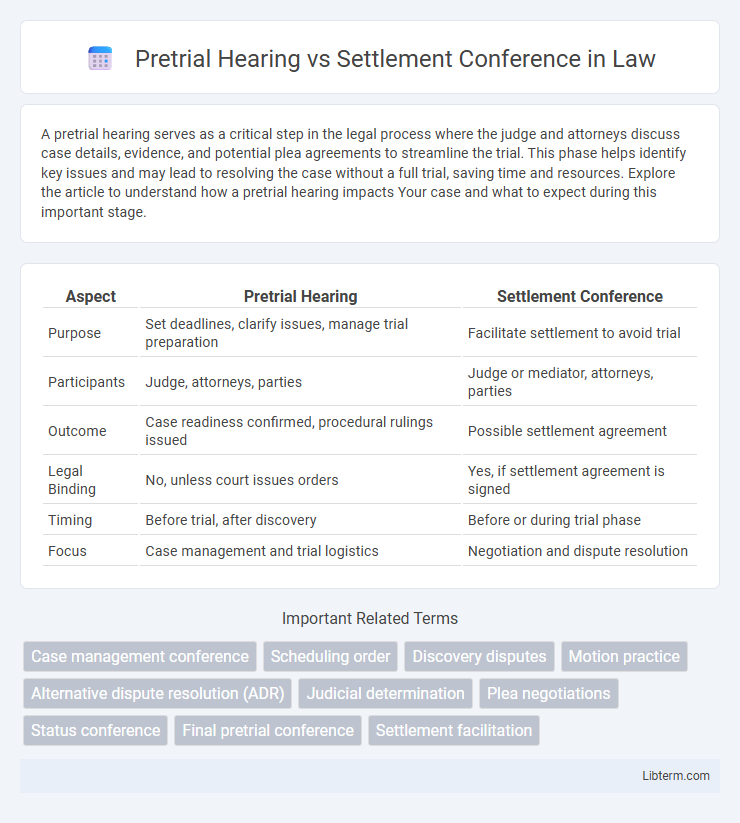A pretrial hearing serves as a critical step in the legal process where the judge and attorneys discuss case details, evidence, and potential plea agreements to streamline the trial. This phase helps identify key issues and may lead to resolving the case without a full trial, saving time and resources. Explore the article to understand how a pretrial hearing impacts Your case and what to expect during this important stage.
Table of Comparison
| Aspect | Pretrial Hearing | Settlement Conference |
|---|---|---|
| Purpose | Set deadlines, clarify issues, manage trial preparation | Facilitate settlement to avoid trial |
| Participants | Judge, attorneys, parties | Judge or mediator, attorneys, parties |
| Outcome | Case readiness confirmed, procedural rulings issued | Possible settlement agreement |
| Legal Binding | No, unless court issues orders | Yes, if settlement agreement is signed |
| Timing | Before trial, after discovery | Before or during trial phase |
| Focus | Case management and trial logistics | Negotiation and dispute resolution |
Introduction to Pretrial Hearing and Settlement Conference
Pretrial hearings serve to clarify issues, establish evidence, and set trial timelines, ensuring both parties are prepared for court. Settlement conferences focus on facilitating negotiations between disputing parties to reach an agreement without proceeding to trial. Understanding the distinct purposes of these legal proceedings enhances case management efficiency.
Key Differences Between Pretrial Hearing and Settlement Conference
Pretrial hearings primarily focus on clarifying legal issues, setting trial dates, and addressing motions, while settlement conferences aim to facilitate negotiated agreements between parties to avoid trial. Judges or neutral third parties often preside over settlement conferences to help reach a resolution, whereas pretrial hearings are typically conducted by the trial judge to prepare the case for trial. The key difference lies in the purpose: pretrial hearings organize trial logistics, whereas settlement conferences seek to resolve disputes amicably before trial.
Purpose of a Pretrial Hearing
A pretrial hearing primarily serves to identify and resolve procedural issues, streamline the trial process, and facilitate the exchange of evidence between parties. It aims to set clear timelines, address motions, and encourage potential stipulations to avoid unnecessary delays during trial. This hearing ensures that all parties are prepared for trial by clarifying legal and factual matters in advance.
Purpose of a Settlement Conference
A Settlement Conference aims to facilitate negotiated agreements between parties before trial, reducing court caseloads and minimizing litigation costs. It encourages open communication and dispute resolution with the help of a neutral mediator or judge, promoting mutually acceptable terms. This process helps avoid the uncertainty and expense of a trial by focusing on compromise and settlement opportunities.
Legal Procedures in Pretrial Hearings
Pretrial hearings serve as critical legal procedures designed to clarify issues, evaluate evidence admissibility, and establish trial readiness, ensuring efficient case management. These hearings enable judges to address motions, rule on evidentiary disputes, and set timelines for trial preparation, thereby reducing surprises and procedural delays. In contrast, settlement conferences primarily aim to facilitate negotiated resolutions between parties to avoid trial, lacking the formal procedural rigors of pretrial hearings.
Settlement Conference Process and Structure
The settlement conference is a structured negotiation process where parties voluntarily meet, often facilitated by a judge or neutral mediator, to discuss case details and explore resolution options before trial. It typically involves presenting evidence summaries, assessing legal risks, and identifying potential settlement terms to avoid prolonged litigation. This process aims to encourage open communication, clarify issues, and achieve mutually agreeable outcomes, reducing court time and costs.
Roles of Attorneys and Judges
Pretrial hearings involve attorneys presenting motions, evidence, and arguments to judges who assess case readiness and rulings, while settlement conferences are collaborative meetings where attorneys negotiate potential resolutions under the judge's guidance to avoid trial. Judges play an active role in pretrial hearings by making procedural decisions and ensuring compliance with legal standards, whereas in settlement conferences, they facilitate communication and encourage settlements without imposing judgments. Attorneys prepare strategically for both settings, focusing on legal advocacy in pretrial hearings and negotiation tactics during settlement conferences.
Outcomes of Pretrial Hearings vs Settlement Conferences
Pretrial hearings primarily focus on narrowing the issues for trial, resolving procedural matters, and setting a timeline, often resulting in court orders that streamline the litigation process. Settlement conferences emphasize negotiating a mutually agreeable resolution, which frequently leads to out-of-court settlements and reduces the need for a trial. Outcomes of pretrial hearings tend to clarify legal positions and evidentiary issues, while settlement conferences aim to avoid trial by fostering compromise and agreement.
Benefits and Drawbacks of Each Procedure
Pretrial hearings provide a structured environment to clarify legal issues, streamline evidence presentation, and address procedural matters, but they can be time-consuming and costly due to formal legal requirements. Settlement conferences encourage open negotiation and cooperation between parties, potentially leading to faster, mutually agreeable resolutions, though they may lack the formality needed to resolve complex disputes definitively. Understanding the balance between the procedural rigor of pretrial hearings and the collaborative nature of settlement conferences helps parties choose the most effective approach for dispute resolution.
Choosing Between Pretrial Hearing and Settlement Conference
Choosing between a pretrial hearing and a settlement conference depends on the case's complexity and the parties' readiness for resolution. Pretrial hearings primarily focus on procedural issues and trial preparation, while settlement conferences aim to facilitate negotiation and encourage settlement. Evaluating the likelihood of settlement and the need for court intervention helps determine the most strategic choice.
Pretrial Hearing Infographic

 libterm.com
libterm.com